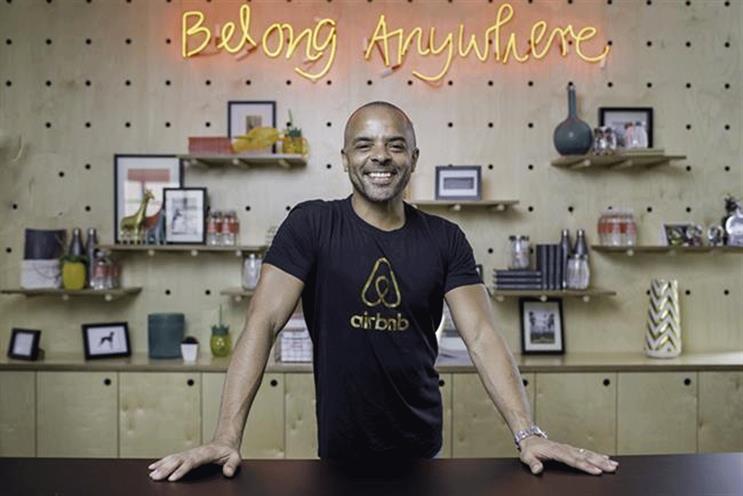
Airbnb CMO on using ‘uncomfortable truths’ to power campaigns
Humanity, creativity and diversity are words Airbnb CMO Jonathan Mildenhall uses a lot, but "uncomfortable truth" is his phrase of the moment.
Mildenhall has spent a lifetime confronting uncomfortable truths, and it holds him in good stead as he runs the marketing at a company with an in-built suspicion of the subject. "I often describe myself as the chief dirty word officer", he laughs.
The company’s first global campaign, "Never a stranger", last year addressed the "uncomfortable truth of our business". Mildenhall explains, "If you said to somebody you were staying with Airbnb, they’d say: ‘Why would you stay with strangers?’" They'll say it less often now, after the campaign generated massive brand awareness and a surge in bookings.
This year’s uncomfortable truth is how "modern travel is sick", Mildenhall says. "Why would people want to be shepherded around when they can hang out in local neighbourhoods with locals? The campaign says ‘Live there’, anywhere around the world, even if just for a night. That’s what a younger millennial audience wants."
Coke’s marketing director on why a good marketer is a good caretaker
Coca-Cola has just replaced Coke Zero with Coca-Cola Zero Sugar, which has a formulation that tastes more like classic Coke and packaging that looks more like that of the flagship product.
Bobby Brittain, marketing director at Coca-Cola Great Britain, says this is motivated by keeping the main brand as strong as possible. "We’ve been around for 130 years; the stewardship of this brand dictates that we all leave it in better shape than we found it. That is our internal objective and everything we do is designed to improve the legacy, the overall standing of the trademark.
"Innovation – not just in terms of product and packaging, but also things like the ways we derive insights from consumers – that’s a critical enabler of the brand’s overall standing."
Sponsoring the Premier League isn’t just about football, says Carling brand boss
Carling’s return to the Premier League, this time as its official beer partner, is not just about scoring more sales with football fans, said brand director Jim Shearer – it’s about being at the heart of the national conversation.
"In a way we’ve never been away from football," he said. "Football and beer are absolutely a common language – Carling has a desire to be part of that and the stories that flow from it.
"But the main thing for us is that we can use that association to create a conversation. It’s about the chance to be a part of the most prevalent conversation in this country." Research in 2015 by Populus found that 44% of UK adults were interested in football, while 35% actively followed the Premier League.
"We’re a sociable brand that’s about broad friendship groups – it’s not necessarily about going to watch the game itself," he added. "The kind of attitude that we want to adopt is one of entertainment rather than pure football content."
Why Halfords got in touch with its emotions
Halfords had a problem: people knew its brand and had an idea of at least some of the things it offered, but didn’t have a clear sense of its identity, or any emotional attachment to it. This is what marketing director Karen Bellairs wanted to change with Halfords’ recent brand relaunch, which is built around the idea of journeys.
"Our marketing has been kind of schizophrenic in terms of look and feel over the years – we haven’t had this kind of brand platform before," she said. "With that comes consistency, creative glue, the right look and feel. This is a big step change for us.
"We’ve learnt that consumers really know Halfords, but when we go a bit deeper, we start to see that they don’t really know why the brand exists, the part it plays in their lives. Our marketing spend has been very driven by price and promotions, and we’re trying to move that forward into really celebrating the brand.
"We learnt that we can be the difference between a good and a bad journey. Consumers’ time is really precious. People spend a lot of time on their journeys, whether that’s bikes or cars, and actually they really want to feel in control of that."
Why Hyundai scaled up for its Euro 2016 activation
Hyundai is a brand of significant scale – it recently sold its one millionth car in the UK – but it doesn’t yet have the level of recognition of larger, more established car brands, says marketing director David Pugh.
So in order to make the most of its sponsorship of Euro 2016, Hyundai set out to do something truly spectacular that visitors would never forget, and that would reverberate across social media: the FanDome, a 1000-capacity, 360 degree viewing experience at London’s King’s Cross.
"We think the event will stand out because it is truly unique – there’s never been anything like it before," said Pugh. "We think the experience inside the dome will be a truly memorable event in a way that conventional sponsorship activity probably won’t."
"It will have a life beyond the confines of King’s Cross through audience amplification – our hope is that everyone will share it with their friends and relatives through social media because they’ll never have seen anything like it before. And you’ll go home in absolutely no doubt about who was organising the experience you’ve just had."
Don’t pat yourself on the back too hard, says Barclaycard CMO
Barclaycard recently turned 50 – but despite the milestone, chief marketing officer Katherine Whitton was determined to avoid the common faux pas of brand birthdays.
"Often brands kind of get it wrong – anniversary comms tend to be a little bit self-congratulatory," she says. "In the UK landscape, 50 years isn’t actually that long – our parent company is 325 years old."



.jpg)
.jpeg)
